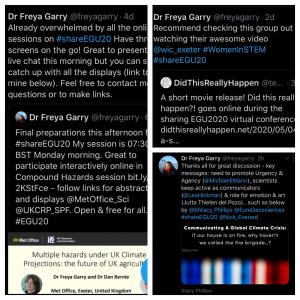By Dr Freya Garry, Met Office
After excitedly submitting an abstract in January to attend my favourite conference, the world changed in ways that those of us who don’t study pandemics never really contemplated before. As such, the European Geophysical Union (EGU) symposium, usually held in Vienna, this year transitioned to a great online experiment. Typically, well over 15,000 people normally attend EGU, and it is growing every year.
Instead of a ten-minute presentation or standing by a poster for a couple of hours in a crowded poster session, researchers participated in online chat sessions, with all the authors’ presentation materials uploaded beforehand to download. After reviewing the presentations that you were interested in, the chat then gave anyone the chance to question the authors.
As a new format, I was a little nervous about how this would work. Luckily, for the session I was presenting, the convenors were well organised and had been in touch beforehand, and they had a plan which they kept to. This was vital as I was presenting in the very first session on the Monday, at 07:30 British Summer Time.
Diversity and inclusion
A few sessions also set up Zoom webinars or will be hosting them over the next few weeks. It was nice to have a break from text chats, see some faces and listen to presentations. However, this format doesn’t necessarily work well for everyone without high speed internet and was not chosen by EGU because text-based chats were more inclusive.
It was great to see the consideration of di versity, equality and inclusion, and I attended sessions which showcased different diversity initiatives across the geosciences. I also attended a discussion meeting for Share EGU Pride, and EGU changed their Twitter icon to EGU Pride for the Friday of the conference, which was a nice show of support for diversity, equality and inclusion.
versity, equality and inclusion, and I attended sessions which showcased different diversity initiatives across the geosciences. I also attended a discussion meeting for Share EGU Pride, and EGU changed their Twitter icon to EGU Pride for the Friday of the conference, which was a nice show of support for diversity, equality and inclusion.
The dynamic chats gave everyone chance to ask questions in a format less daunting than asking after a presentation in front of everyone, but more daunting than talking one-to-one at poster sessions (especially after being greeted by a friendly face).
Chats may not have been that easy for those who can’t skim read in English, or who can’t type fast. A huge amount of information was shared, and I hope at least some of it is sticking in my brain; many of the chats moved so fast that it was not easy to gain in-depth understanding during the chat. I’m relying on my notes and memory to prompt me to go and revisit the research to learn more detail over the coming weeks.
Managing online work/life balance
If, like me, you were overambitious and tried to keep up with multiple sessions simultaneously (which is less easy to do at a physical meeting), it got very tiring and due to the number of interesting sessions I wanted to attend, I worked long hours too (including on my birthday and on a UK bank holiday)! However, I did still have energy on Friday afternoon to absorb the sessions; the drawback of no evening meal out meant the benefit of rest and recovery. I look forward to a long weekend to give the mind time to rest though.
Talking of work/life balance, there were excellent short courses, including one about taking care of your wellbeing. Conferences can be a time when the imposter phenomena surfaces; it’s easy to see experts in many areas discussing work at a very high level and feel inadequate. But, of course, you are there because you are an expert in something too, and no one can be expert in everything. I really enjoyed another short course entitled ‘Blogging for Beginners’. Instead of a workshop session over the lunch break, these sessions were uploaded on YouTube at lunchtime so I could enjoy them as I grabbed some food. A big plus of being at home – no long queues to get food!
The future for virtual conferences?
There has been a growing conversation in recent years about the role of scientists in setting an example by reducing their own carbon footprint. With everyone suddenly working from home, we find that opportunities to have conferences online can work well, and it will be interesting to see how conferences going forward learn lessons about integrating virtual aspects, or perhaps for some remaining entirely virtual.
There were other ‘Union Symposia’ and ‘Great Debate’ style webinars as well, where a smaller number of experts discussed topics like values vs. facts, and communicating as scientists, all of which were recorded. I tried to do a little for science communication, tweeting from @freyagarry, but to be honest, I didn’t have much time as there were so many sessions that I was trying to keep an eye on (the curse of the generalist researcher).
Do check out the presentations at EGU which will be available on egu2020.eu until 31 May 2020, and the videos of short courses, Union Symposium, and Great Debates that have been uploaded on the European Geosciences Union channel on Youtube.
Dr Freya Garry will be leading the UK Climate Resilience webinar session, ‘How will multiple climate hazards impact UK food over the 21st century?’ on Wednesday 10th June, 12.00-13.00. Register for the webinar

